Connie Johnson Hambley's Blog, page 22
October 28, 2015
The Agony and the Ecstasy of Being Indie
I had a tough moment a few days ago. Ever have a nightmare where you arrive at work only to realize you're not wearing pants? Yeah. Kinda like that. But I was very, very awake.
I attended a book launch of a friend of mine. She's a local favorite, traditionally published by one of the big houses, and knows how to write terrific women's fiction. The bookstore where she has launched many of her six novels is a cornerstone of the community. Combine a local favorite with a trusted bookstore and you get a crowd of book loving folks and avid readers. I recognized more than a few faces of the writing community. Authors, publicists, columnists, and fans dotted the audience.
My friend is a hybrid author. Toward the end of the Q and A segment of her talk, a question prompted a discussion of traditionally versus independently published books. My name came up as an example of independently published. The audience member had read my first book, The Charity, and said she enjoyed it and did not know I was independently published.
This is where I wish I had pinched myself awake.
The discussion touched on editorial quality. When asked if the audience member saw typographical errors in my book versus traditionally published books, she wagged her hand in the air in a pantomime of balance and said, "Well..." The drawn out word and hand gesture sliced into me like a hot knife through butter.
But wait. It gets worse.
The bookstore owner used the opportunity to talk about some of the self-published train wrecks she had declined to put on her shelves. For what seemed like forever, the owner vented on the demise of publishing quality due, in no small way, to the deluge of self-published crap that has flooded the market.
I was guilty by association. In that conversation, in that horrible moment where reality and nightmare merged, in a room filled with my peers, I was lumped together with the crap she wouldn't put on her shelves.
I withered. My pants were no where to be found.
The event ended and the reception and book signing began. Still trying to process exactly what had happened, I immediately went to the owner. I asked if she would prefer my books be removed from her shelves.
The conversations I've had since that moment have nurtured me. The owner said my books wouldn't be on her shelves if they were not good books. I've launched both The Charity and The Troubles at her shop and sold, by her observation, more books than many best-selling and widely known authors did when they have had events with her. To her, my books are not crap. I deserve the right to be on her shelves because I do the work. I make sure I produce a quality product.
At a writers' dinner, my friend approached me and apologized for not defending me right then and there. She confessed that her traditionally published books have typos despite the fact that she has a team of editors, designers, and proof readers at her disposal. Other folks have expressed their support of me. To each one, I am grateful.
I'm not going to thump on a table top and proclaim my perfection, nor am I going to pick apart a traditionally published work as not being as good as many independently published works. I understand that in a rapidly changing world, it's easier to find reasons to dismiss than to support.
My books are my business. I put out a damn good product.
Here's the irony. The audience member made a point to speak with me afterwards, expressing surprise. She sensed she had touched off something, but was simply happy to meet me. We chatted for a bit. Her name was familiar.
Turns out she had reached out to me via my website a year earlier. She had purchased my book at another location. Maybe the version she had did have a typo. I don't know. All I know is that one luxury of being indie is I can upload corrected versions of my books, and do, something traditionally published can't do easily.
She contacted me out of the blue all those months ago because (drum roll please) she loved my book. Her five star review on Amazon is short and sweet.
I attended a book launch of a friend of mine. She's a local favorite, traditionally published by one of the big houses, and knows how to write terrific women's fiction. The bookstore where she has launched many of her six novels is a cornerstone of the community. Combine a local favorite with a trusted bookstore and you get a crowd of book loving folks and avid readers. I recognized more than a few faces of the writing community. Authors, publicists, columnists, and fans dotted the audience.
My friend is a hybrid author. Toward the end of the Q and A segment of her talk, a question prompted a discussion of traditionally versus independently published books. My name came up as an example of independently published. The audience member had read my first book, The Charity, and said she enjoyed it and did not know I was independently published.
This is where I wish I had pinched myself awake.
The discussion touched on editorial quality. When asked if the audience member saw typographical errors in my book versus traditionally published books, she wagged her hand in the air in a pantomime of balance and said, "Well..." The drawn out word and hand gesture sliced into me like a hot knife through butter.
But wait. It gets worse.
The bookstore owner used the opportunity to talk about some of the self-published train wrecks she had declined to put on her shelves. For what seemed like forever, the owner vented on the demise of publishing quality due, in no small way, to the deluge of self-published crap that has flooded the market.
I was guilty by association. In that conversation, in that horrible moment where reality and nightmare merged, in a room filled with my peers, I was lumped together with the crap she wouldn't put on her shelves.
I withered. My pants were no where to be found.
The event ended and the reception and book signing began. Still trying to process exactly what had happened, I immediately went to the owner. I asked if she would prefer my books be removed from her shelves.
The conversations I've had since that moment have nurtured me. The owner said my books wouldn't be on her shelves if they were not good books. I've launched both The Charity and The Troubles at her shop and sold, by her observation, more books than many best-selling and widely known authors did when they have had events with her. To her, my books are not crap. I deserve the right to be on her shelves because I do the work. I make sure I produce a quality product.
At a writers' dinner, my friend approached me and apologized for not defending me right then and there. She confessed that her traditionally published books have typos despite the fact that she has a team of editors, designers, and proof readers at her disposal. Other folks have expressed their support of me. To each one, I am grateful.
I'm not going to thump on a table top and proclaim my perfection, nor am I going to pick apart a traditionally published work as not being as good as many independently published works. I understand that in a rapidly changing world, it's easier to find reasons to dismiss than to support.
My books are my business. I put out a damn good product.
Here's the irony. The audience member made a point to speak with me afterwards, expressing surprise. She sensed she had touched off something, but was simply happy to meet me. We chatted for a bit. Her name was familiar.
Turns out she had reached out to me via my website a year earlier. She had purchased my book at another location. Maybe the version she had did have a typo. I don't know. All I know is that one luxury of being indie is I can upload corrected versions of my books, and do, something traditionally published can't do easily.
She contacted me out of the blue all those months ago because (drum roll please) she loved my book. Her five star review on Amazon is short and sweet.
Published on October 28, 2015 06:14
October 16, 2015
Indie or Tradional? What Matters is Being Relentless

Have you been reading the press lately? Traditionally published authors are earning less than ever. What has increased? The time spent on marketing.
Don't fool yourself. Whether you have a team through your publisher or you are your team as an indie, positioning your work and your brand to find readers is not easy. Even as a trad, at some point the effort to push will fall at your feet, and your feet only. You may have pushed through the top trending Five Steps to Success and wonder why you're not swimming in readers. You've done what the experts have told you to do, but wonder why success hasn't been bestowed upon you yet. What are you doing wrong?
Most likely, you're doing everything right. The only tweak needed is to become relentless.
Applying business development and marketing skills is not easy for many writers and authors. You've swallowed the castor oil of identifying your core identity (brand), crafting a message, targeting an audience, and reaching out via your different platforms. Then you wipe the sweat from your brow and sit back, waiting for the readers to come. When they don't flock in the numbers you want, you fear your process was flawed and you thrash about finding and experimenting with another recipe for the magic sauce.
Stop thrashing for the next Big Idea and adopt an athlete's focus. Success comes from repeating the same sprint, or lifting the same weight, over and over again. The mindset needed is not much different from what we writers do when crafting a paragraph. We go over it again and again. We are relentless in our craft. We just have to apply that mindset to our marketing efforts.
Failure or the word "No" are things that most writers shrink from, but business development professionals take in stride. We writers can be a fragile bunch yearning to be read and liked, but BD folks know that you learn a lot from rejection and a failure. Failures don't stop them in their tracks. Instead, the reasons why something failed are examined and a new or modified approach is taken. BD folks don't let the Big Account get away just because one pitch on one particular day did not succeed. They circle back, reassess, and re-approach with a refined pitch.
Times have changed and a commitment to writing includes acknowledging it takes time to build a following.
Don't stop. Keep going. Go back to the well again and again. Be relentless.
Published on October 16, 2015 06:13
Indie or Trad? What Matters is Being Relentless

Have you been reading the press lately? Traditionally published authors are earning less than ever. What has increased? The time spent on marketing.
Don't fool yourself. Whether you have a team through your publisher or you are your team as an indie, positioning your work and your brand to find readers is not easy. Even as a trad, at some point the effort to push will fall at your feet, and your feet only. You may have pushed through the top trending Five Steps to Success and wonder why you're not swimming in readers. You've done what the experts have told you to do, but wonder why success hasn't been bestowed upon you yet. What are you doing wrong?
Most likely, you're doing everything right. The only tweak needed is to become relentless.
Applying business development and marketing skills is not easy for many writers and authors. You've swallowed the castor oil of identifying your core identity (brand), crafting a message, targeting an audience, and reaching out via your different platforms. Then you wipe the sweat from your brow and sit back, waiting for the readers to come. When they don't flock in the numbers you want, you fear your process was flawed and you thrash about finding and experimenting with another recipe for the magic sauce.
Stop thrashing for the next Big Idea and adopt an athlete's focus. Success comes from repeating the same sprint, or lifting the same weight, over and over again. The mindset needed is not much different from what we writers do when crafting a paragraph. We go over it again and again. We are relentless in our craft. We just have to apply that mindset to our marketing efforts.
Failure or the word "No" are things that most writers shrink from, but business development professionals take in stride. We writers can be a fragile bunch yearning to be read and liked, but BD folks know that you learn a lot from rejection and a failure. Failures don't stop them in their tracks. Instead, the reasons why something failed are examined and a new or modified approach is taken. BD folks don't let the Big Account get away just because one pitch on one particular day did not succeed. They circle back, reassess, and re-approach with a refined pitch.
Times have changed and a commitment to writing includes acknowledging it takes time to build a following.
Don't stop. Keep going. Go back to the well again and again. Be relentless.
Published on October 16, 2015 06:13
September 22, 2015
Upcoming Events or Why I Can't Say "NO!"

My timing will have to show off some military precision this fall, but I'm loving having so many opportunities to meet with readers and fellow authors. Links bring you to Facebook. Join the event, invite friends, and like my page to keep in touch!
September 26: Village Square Bookstore, Bellows Falls, VT
October 7: Tracy Memorial Library Author Event, New London, NH
October 11: Irish Heritage Festival, Dorchester, MA
October 16: Merrimack Council on Aging Book Club, Merrimack, MA
October 24: Peabody South Branch Author Fair, Peabody, MA (11:00 to 1:00)
October 24: Boston Book Festival/Sisters in Crime, Boston, MA (3:00 to 4:00)
November 1: Martha Canfield Library, Arlington, VT (2:00 to 4:00)
November 6 - 8: Crimebake, Dedham, MA
November 8: Local Author Fair, Ipswich, MA (1:00 to 4:00)
November 12 - 15: Equine Affaire, Taborton Books (various times)
November 14: K9 Gala: Mystery/Thriller Authors Fundraiser for K9s (6:00 to 11:00)
November 19: Emma Andrews Library Author Talk (6:30 - 8:30)
December 3: Mystery Gala at New England Mobile Book Fair (6:00 to 9:00)
Published on September 22, 2015 10:34
September 16, 2015
"A Short Story About a Horse Named Evan" by K
(It might not seem like a lot to you, but the pages shown here evidence a mountain climbed. I've mentioned K and her short story before. I've transcribed her story here.)
There is a field where I like to go riding all the time. Evan likes being outside. He likes when I ride him. The Farm name is called WindRush Farm. There is one large to middle size barn on this field. This barn looks more like a sm. eat in diner and there are very very interesting smells and this east in diner has a lot of very interesting horse equipment on each corners. On the walls the name each equipment are rains, the bit, a pair of sturups, a saddle.
Evan is quit a big horse and when I'm standing right up against a big horse like Evan it makes me feel a little small because he's so big. But I'm not aftaid of him at all because he's so gentle. I like to brush him a lot. I have to kind of stand up on my tippytoes to brush him.
Evan is a mixs breed. He would have one color on his head area and another color mixs into that for his mane and tail which is all braided. It looks very horse like when Evan is not happy he would buck and kick you when he's not in a good mode. You will see his ears go forward a little more and hold his head up really big and when I put him away at night in barn he would sqeal for more riding time. Every night he would do this he would to these very interesting where he would bring everything to be in his mouth like hes raines a rope.
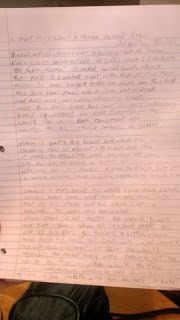
I put his bit in his mouth he doesn't like when he wears a bit because it like pulls on his mouth a little
When I put the saddle on him thats when his all happy and jumpy all around the barn. He like when I ride him if anyone goes near him he doesn't like it. He gets pretty upset he would bit you or even kick or head butt you to make away from him.
When I ride Evan he would like to on these very long trail rides up in the woods
to see different stuff like cabins, a lot of trees and big barns and hills
it makes me feel pretty special and pretty smart sitting in the saddle a little bit scared. But not as much. I'm happy to ride him.
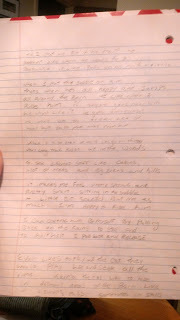 I can control him by myself by pulling back on the rains to stop and to half halt I pull back and release.
I can control him by myself by pulling back on the rains to stop and to half halt I pull back and release.
Evan likes to play with the cat. They would play hide and seek all the time. Karma the cat like to hid in different areas of the Barn Like in the Buckets pails sometimes in stalls
Behind things and Evan would go find her sometimes it would be very seeky
At night he would go crazy bananas when I feed her Evan would eat right out of my hand like carrots, apples or I put it into a bucket or a pail.
and for water I put a buck out for him and he would lap it all up.
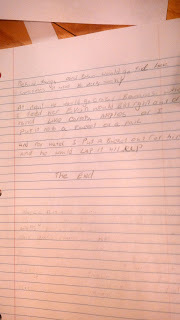
The End
There is a field where I like to go riding all the time. Evan likes being outside. He likes when I ride him. The Farm name is called WindRush Farm. There is one large to middle size barn on this field. This barn looks more like a sm. eat in diner and there are very very interesting smells and this east in diner has a lot of very interesting horse equipment on each corners. On the walls the name each equipment are rains, the bit, a pair of sturups, a saddle.
Evan is quit a big horse and when I'm standing right up against a big horse like Evan it makes me feel a little small because he's so big. But I'm not aftaid of him at all because he's so gentle. I like to brush him a lot. I have to kind of stand up on my tippytoes to brush him.
Evan is a mixs breed. He would have one color on his head area and another color mixs into that for his mane and tail which is all braided. It looks very horse like when Evan is not happy he would buck and kick you when he's not in a good mode. You will see his ears go forward a little more and hold his head up really big and when I put him away at night in barn he would sqeal for more riding time. Every night he would do this he would to these very interesting where he would bring everything to be in his mouth like hes raines a rope.

I put his bit in his mouth he doesn't like when he wears a bit because it like pulls on his mouth a little
When I put the saddle on him thats when his all happy and jumpy all around the barn. He like when I ride him if anyone goes near him he doesn't like it. He gets pretty upset he would bit you or even kick or head butt you to make away from him.
When I ride Evan he would like to on these very long trail rides up in the woods
to see different stuff like cabins, a lot of trees and big barns and hills
it makes me feel pretty special and pretty smart sitting in the saddle a little bit scared. But not as much. I'm happy to ride him.
 I can control him by myself by pulling back on the rains to stop and to half halt I pull back and release.
I can control him by myself by pulling back on the rains to stop and to half halt I pull back and release.Evan likes to play with the cat. They would play hide and seek all the time. Karma the cat like to hid in different areas of the Barn Like in the Buckets pails sometimes in stalls
Behind things and Evan would go find her sometimes it would be very seeky
At night he would go crazy bananas when I feed her Evan would eat right out of my hand like carrots, apples or I put it into a bucket or a pail.
and for water I put a buck out for him and he would lap it all up.

The End
Published on September 16, 2015 06:30
September 13, 2015
Guest Gigs and Blog Discovery
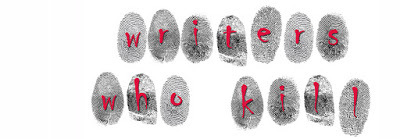 Hey all!
Hey all!I confess to neglecting keeping my blog current. I write at least one blog post a week, but often those posts are as a guest on one the many terrific blogs out there.
I thought I'd keep you posted (pun intended) on a few I've done recently. These are some fantastic blogs and I urge you to check out the authors. They are a handy resource for readers as well as writers.
In no particular order, they are:
Writers Who Kill: I love their masthead pictured above. I was the guest of E. B. Davis, a prolific and talented mystery writer with an easy and engaging style. My post answers the question how fiction writers and lawyers are alike. It turns out they share a lot of skills. Post is here.Boston folks know Hank Phillippi Ryan as a top-notch investigative reporter they see on TV. Readers know her as the author of the best selling Jane Ryland series. When she asked me to be a guest on her Femmes Fatale blog, I jumped at the chance! Hanging with other "ferociously talented women dedicated to the fine art of crime fiction" is exactly what I love doing! My post on GRIT is hereDale T. Phillips has a very active life as a writer of hard boiled crime, short stories and more. His blog and website are well worth cruising to see what a New England based author does to promote his work and support others. When he asked me to do a blog interview, I jumped at the chance. Click here to read the Blog Interview.Penny de Byl is an author from Down Under. Meeting in the small village created by social media, Penny reached out to me all the way from Australia to be featured as the first author in her Five Minute Profile series. Cruise her blog and see what's hot in Australia, too. Link to my interview is here.
Christine Meunier is another author from Down Under. She has thriving equine education blogs and hosted me on her blogs. Rhonda Lane is a fellow Sister in Crime, horse lover, and blogger. She has a great blog that covers all things horse and a terrific sense of humor. My guest gig on her site is here. I don't always blog on writing or my background. Stef Reinhold, an expert on horse wellness, asked me to post in her award-winning blog. My topic? Mindfulness in riding. Ahhh... Link here.
 Of course, I was beyond excited to be featured as Hallie Ephron's guest on the wildly popular blog Jungle Reds.
Of course, I was beyond excited to be featured as Hallie Ephron's guest on the wildly popular blog Jungle Reds.On October 15, 2015, I'll be on Renee Scattergood's blog with an interview with Jessica Wyeth, my books' protagonist. You won't believe the things Jessica says!
Published on September 13, 2015 11:47
August 27, 2015
Equus Education Blog Hop: Former Lawyer/Author
Christine Meunier-- Australian equestrian, author and educator of equine studies -- asked me to join her blog hop to get the word out on careers that involve horses. Even being a horse lover without a horse qualifies me to weigh in. So, here we go! (Make sure to check out Christine's blog, too.)
Christine: What is your horse related career?I write mainstream thrillers that use the colorful world of horse people as a background and characters. Note I didn't use the word "equestrian" when talking about my characters. Horse people are far more entertaining than most equestrians. Ever been to a racetrack? Those men in grimy, threadbare suits, a chewed cigar dangling from their mouths, holding tout sheets are horse people. Colorful? Yes. Equestrians? No. Christine: Where in the world can we find you?The short answer is Boston, Massachusetts, U.S.A. The long answer is in front of my keyboard anywhere that has decent internet. Christine: Is your horse career able to be carried out in part online?In truth, I don't need the internet to write a story. That said, I put hours into research to make sure my settings ring true, the politics and dates are correct, and to make sure my dialects are spot on. My recent online searches were on the airlines dedicated to shipping horses internationally. What vet forms and vaccines are needed? Are horses sedated? Are they secured in a stall during a flight? Are quarantine requirements different in each country? Are requirements different for breeding stock or show animals? See? You need to know this stuff to write believable stories. Oh, yeah. And don't forget the social media marketing efforts that all authors have to be competent in.Christine: Do you need a qualification to do your job?It's not so much what you need as what you don't need. You do not need all of your marbles to dedicate yourself to writing fiction. I'm a lawyer by training, but not by temperament. Deciding to become a lawyer when I really hate conflict was a bad, bad career decision. However, law school made me into a better writer because each word that touches a page matters. Seriously. You can win or lose a case on the wrong use of one measly little word. "And/or" anyone? Also, legal writing has a definite point and direction from the first sentence on. So does writing crackling suspense novels. It's all about the persuasion of your reader.Christine: What's the best thing about your job?I love many aspects of what I do. The freedom to create is huge for me. Hearing that my readers have had a terrific reading experience between the covers of my books is tremendously gratifying.
Christine: What is your horse related career?I write mainstream thrillers that use the colorful world of horse people as a background and characters. Note I didn't use the word "equestrian" when talking about my characters. Horse people are far more entertaining than most equestrians. Ever been to a racetrack? Those men in grimy, threadbare suits, a chewed cigar dangling from their mouths, holding tout sheets are horse people. Colorful? Yes. Equestrians? No. Christine: Where in the world can we find you?The short answer is Boston, Massachusetts, U.S.A. The long answer is in front of my keyboard anywhere that has decent internet. Christine: Is your horse career able to be carried out in part online?In truth, I don't need the internet to write a story. That said, I put hours into research to make sure my settings ring true, the politics and dates are correct, and to make sure my dialects are spot on. My recent online searches were on the airlines dedicated to shipping horses internationally. What vet forms and vaccines are needed? Are horses sedated? Are they secured in a stall during a flight? Are quarantine requirements different in each country? Are requirements different for breeding stock or show animals? See? You need to know this stuff to write believable stories. Oh, yeah. And don't forget the social media marketing efforts that all authors have to be competent in.Christine: Do you need a qualification to do your job?It's not so much what you need as what you don't need. You do not need all of your marbles to dedicate yourself to writing fiction. I'm a lawyer by training, but not by temperament. Deciding to become a lawyer when I really hate conflict was a bad, bad career decision. However, law school made me into a better writer because each word that touches a page matters. Seriously. You can win or lose a case on the wrong use of one measly little word. "And/or" anyone? Also, legal writing has a definite point and direction from the first sentence on. So does writing crackling suspense novels. It's all about the persuasion of your reader.Christine: What's the best thing about your job?I love many aspects of what I do. The freedom to create is huge for me. Hearing that my readers have had a terrific reading experience between the covers of my books is tremendously gratifying.
Published on August 27, 2015 08:56
August 20, 2015
Stealing From A Priest
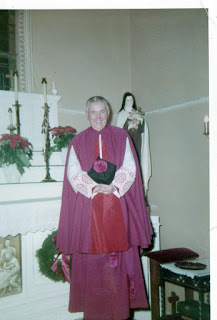 Father Adrian Storm. Photo courtesy of Dorothy RackPeople frequently ask where the inspirations for stories or characters for my books come from. Writing fiction gives me a lot of leeway in what I do with a spark of an idea. For me, a Lego figure is not merely a hunk of useless plastic. At a minimum, it is a trigger for memories of the birthday gift unwrapped by a child squealing with joy. Maybe it becomes a cable holder. Cobbling the junkie flotsam of my brain together for a new use is creative fun.In writing "The Troubles," I had a few obstacles to navigate. My book is not a "religious" book, but one cannot write about the political conflict in Northern Ireland without being aware of how religious beliefs motivate a person's behavior. I wanted to stay true to the history and the motivations of the conflict while departing from facts enough to weave a good tale. Bringing characters to life that carry the story is hard work, and making the reading fun for the reader is a challenge. I wrap fiction around facts, and facts around fiction, to blur the sharp edges of reality and make the story flow. Sometimes, the mere use of a name is enough to trigger the creative grease that makes the process work.The picture above is of Father Adrian Storm, parish priest of Pawling, New York. I don't ever recall Father Storm when he did not have a smile on his face or in his heart. Sunday mornings were spent in a building we called the "Lyceum" where he held a mass for children. After mass, and before our catechism lessons began, he would quiz us on bible stories or what the differences were between a venial or mortal sin. Then a plastic rosary or other religious trinket would be given to the kid who proudly gave the right answer. He is remembered and loved for his piano playing and discrete shots of whiskey. Bits and pieces of Adrian Storm were snatched out of life and tucked into my memories. I named a character in my book to honor him. Father Ignatius Storm is a very different man from Father Adrian Storm. The character is not the man smiling above. Ignatius is a concoction of fiction. But using the name "Father Storm" conjured wonderful memories for me and helped me form a three dimensional man full of love, loyalty, and complexity. Ignatius provided a vehicle for showing the toll on a priest who is the keeper of secrets and sins. He provided a way to unfold the heart of my story.The Father Storm of my youth is remembered for his warmth and boundless love. He was the heart and soul of a thriving parish. He christened many, married others, and buried more than his share. So, I stole the love he had for his community. I secreted away the trust his parishioners freely gave him. I used this loot as my own.I've said my five Hail Marys and ten Our Fathers in confession of my theft.I hope that's enough.
Father Adrian Storm. Photo courtesy of Dorothy RackPeople frequently ask where the inspirations for stories or characters for my books come from. Writing fiction gives me a lot of leeway in what I do with a spark of an idea. For me, a Lego figure is not merely a hunk of useless plastic. At a minimum, it is a trigger for memories of the birthday gift unwrapped by a child squealing with joy. Maybe it becomes a cable holder. Cobbling the junkie flotsam of my brain together for a new use is creative fun.In writing "The Troubles," I had a few obstacles to navigate. My book is not a "religious" book, but one cannot write about the political conflict in Northern Ireland without being aware of how religious beliefs motivate a person's behavior. I wanted to stay true to the history and the motivations of the conflict while departing from facts enough to weave a good tale. Bringing characters to life that carry the story is hard work, and making the reading fun for the reader is a challenge. I wrap fiction around facts, and facts around fiction, to blur the sharp edges of reality and make the story flow. Sometimes, the mere use of a name is enough to trigger the creative grease that makes the process work.The picture above is of Father Adrian Storm, parish priest of Pawling, New York. I don't ever recall Father Storm when he did not have a smile on his face or in his heart. Sunday mornings were spent in a building we called the "Lyceum" where he held a mass for children. After mass, and before our catechism lessons began, he would quiz us on bible stories or what the differences were between a venial or mortal sin. Then a plastic rosary or other religious trinket would be given to the kid who proudly gave the right answer. He is remembered and loved for his piano playing and discrete shots of whiskey. Bits and pieces of Adrian Storm were snatched out of life and tucked into my memories. I named a character in my book to honor him. Father Ignatius Storm is a very different man from Father Adrian Storm. The character is not the man smiling above. Ignatius is a concoction of fiction. But using the name "Father Storm" conjured wonderful memories for me and helped me form a three dimensional man full of love, loyalty, and complexity. Ignatius provided a vehicle for showing the toll on a priest who is the keeper of secrets and sins. He provided a way to unfold the heart of my story.The Father Storm of my youth is remembered for his warmth and boundless love. He was the heart and soul of a thriving parish. He christened many, married others, and buried more than his share. So, I stole the love he had for his community. I secreted away the trust his parishioners freely gave him. I used this loot as my own.I've said my five Hail Marys and ten Our Fathers in confession of my theft.I hope that's enough.
Published on August 20, 2015 05:26
August 12, 2015
Confessions of a Selfish Volunteer
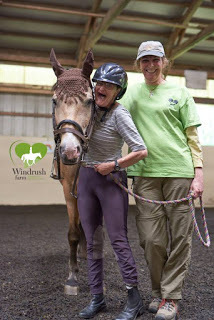 Photo by Michael Prince for Windrush Farms.
Photo by Michael Prince for Windrush Farms.I'll admit it. I am a selfish volunteer.
Websters cites the definition of volunteer as follows:
1. a person who voluntarily offers himself or herself for a service or undertaking.
2. a person who performs a service willingly and without pay.
Implicit in the act of volunteering is some form of giving. Campaigns to conscript volunteers dig their emotional hooks into the guilt of the gifted. "Give back," they implore, as if a person somehow has too much good and needs to siphon off the surplus to balance the world's ills. Even the definition above implies all of the action, and therefore benefit, is one sided. "Undertaking," to me, is too close to "undertaker." The dead aren't exactly known for being active participants in their final repose.
Volunteers may be giving their time without pay, but they are getting something back in return. A feeling of accomplishment or a sense of being a part of a community are worthy in and of themselves. Being engaged in bettering our world by contributing to our neighbor's happiness is a beautiful act of humanity. If this is where the return on the investment of time stopped, most people would end the day happy, and rightly so.
The picture above is from one of my many Wednesday mornings I spend volunteering as a horse handler at Windrush Farm, a therapeutic riding center near my home in Massachusetts. I started volunteering there because I'm a horse lover without a horse and I missed the interaction of being around my four-legged friends. Serendipity paired me with the woman in the photo, I'll call "K."
K's body and brain cannot process the commands to ride a horse quickly enough to be safe in all situations. She has certain capabilities and the horse has certain needs. I assist with the horse only enough to allow her as much autonomy as possible. In the two years we have worked together, she has ridden independently for the first time by walking a large circle with me at its center, without a leadline or sidewalker. It might not seem like much, but for us, we reached the summit of a mountain, together.
This is where most stories of "feel good volunteering" would end. Mine would, too, if it weren't for K.
Earlier this summer, K reached out to me on my Facebook author page. Before this, I had only been the horse handler she knew from the stable, but she learned that I also write. Inspiration took a hold of her, and she wrote a short story about a horse named Evan. Evan, as you may have guessed, is the horse pictured above with us. She asked if I would like to read it and invited me to her home.
At close to fifty years old, that was the first short story K had ever written.
Even as I write those words, I am humbled. Some Wednesday mornings, when it was too cold or too rainy, I wanted to stay warm and dry in my writerly cocoon. The spur to get me moving was K. I knew she would be there and would greet me with that thousand watt smile. K's smile, her joyous spirit, and her infectious positivism have given me more than I can articulate.
And then she wrote a story.
I am no longer giving my time to K or Windrush. I am taking. I am taking inspiration and a feeling I can do anything because I have seen what a positive spirit can accomplish. I am taking back the power that limitations placed on my life because I have seen how barriers do not exist if you do not let them hobble you. I am taking back the selflessness I began with at Windrush and replacing it with selfishness. My Wednesday mornings are MY time, and you're not allowed to interfere.
So there you have it. My confession. In full.
I am a selfish volunteer.
Published on August 12, 2015 07:57
August 4, 2015
The Troubles: Excerpt
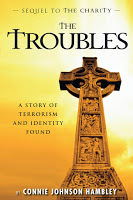 Buy "The Troubles" Today!
Buy "The Troubles" Today!
The Troubles is a high-concept suspense novel that views the conflict in Northern Ireland through the prism of American involvement. This sweeping, multi-generational tale gives witness to the delicate and dangerous layers inside an ever-unfolding world.
(Scene: Jessica Wyeth was forced to flee the States after being falsely accused of murder of a suspected Irish Republican Army operative. She accepts a training job in the northwest of Ireland, close to the border of Northern Ireland, with hopes to distance herself from paparazzi and to learn more about her past.)
Jessica Wyeth needed to cool and blanket her horse before he chilled. A heavy mist fell, coating her hands and face in beads of moisture. She ran her hands down the big gray’s legs checking for soreness would tell if their ride along in the dips and dells of the countryside was too taxing. The wisps of steam rose from Planxty’s back and chest.
As they walked in small circles, she took in the details of her temporary home. A barn and cottage sat on top of a gentle rise. They overlooked fields that held a training ring and jump course. Thickets of trees broke the expanse of hills in the distance. The buildings’ windows, framed in weathered wood, dotted their whitewashed sides. A stone-enclosed courtyard hugged the cottage, and a wooden fence separated it from the barn. The barn was rustic but suited her needs. Eight stalls lined a cobbled corridor, and an annex held a tack room, office, and ladder to the hayloft.
Sensing she wasn’t alone, she peered into the shadows and sifted through the sounds gripped by the ever-present wind. Only a church bell and the bleating of sheep were carried by it. The birdsong sounded more ragged than melodic, and the earth smelled more of decay than spring. Her surroundings were so different she wondered if it was worth the investment of time to become familiar with them.
Jessica patted Planxty’s neck and shook her head free of longings. A chorus of throaty nickers and hooves kicking stall doors greeted her—all welcomed sounds of horses impatient for attention. She was relieved to see a swept corridor and fresh shavings in each of the eight stalls. A full hay bin and feed bucket waited in the empty one. She jotted her observations of the day’s ride in the folder for the local trainer hired to help her. Cryptic notes back and forth did not provide enough insight for effective training. She wrote yet another request to speak with him directly.
Walls made from thousands of dark gray stones no larger than footballs and overgrown with wild roses flanked the paddocks. She gingerly picked a fistful of soft pink blooms and headed back to the cottage. Inside a single bedroom off the living room provided enough living area to be comfortable. A wooden bench and a hand-hewn pegboard holding an oiled canvas barn coat and anorak graced the spare stucco hall. Tall black leather field boots and a pair of drab green rubber Wellies sat on a woven rug. She slipped off her wet fleece and boots and headed to the kitchen to hunt for a vase.
A stout, middle-aged woman didn’t startle when Jessica burst in to the rustic kitchen. Jessica gave a bemused smile at the man-tailored pants, tattered sweater, and crisply starched white apron. As much as Jessica wanted to have a friend in Ireland, Nan O’Reilly would not be the one. The cottage belonged to Nan, housekeeper and main conduit to the outside world.
“Oh, hi Nan,” Jessica said as she picked a thorn out of her thumb. “Do you have anything I can put these in?”
“I do at that.” Nan produced a Mason jar from one of the cabinets and set it on a long, rough-hewn wooden table beside a basket made of black, thorny wood. “Beautiful blooms, these roses. Makes the whole place glow in pink.”
“I could pick armloads of them.” Jessica watched Nan fuss with the flowers with efficient motions. “I wasn’t expecting to see you today.”
“Fair enough, but you should hear that folks are talkin’ about someone riding crazy over the hills.” She wiped her hands on her apron. “The county is filled with tales of one form of spirit or another makin’ an appearance. I don’t listen to such talk, but you should be aware of it.”
“Thanks, but that was hardly worth you making a special trip out here to tell me that.”
Nan lifted her chin. “We don’t get many visitors in these parts, and there’s nothing like a new face to get people talkin’. You must take better care not to be seen. The last thing you need is for people to start thinking they’ve got the “Murdering Heiress” in their backyards.”
Leaving that nickname behind and all that came with it were the reasons she agreed to Michael’s idea of a training job in Ireland. Hearing it again bothered her. “How?” she stumbled, searching for words. “My rides have been away from any homes. You’re the only person I’ve spoken with.”
“I’m just being cautious. You got your share of attention in the papers here as well. You’ve only been resurrected for a few months and we have those here who question how innocent you really are.” Nan’s voice betrayed neither empathy nor disgust.
Jessica flushed. Resurrection was a fitting term, but the cloud around her innocence hurt. Nan’s concerns drove home the point that it will take more than dropping out of sight for a few months to be reborn and live freely. Michael had taken great care to make sure she remained safe, and he trusted Nan to be discrete. She could stop and catch her breath. Michael gave her that hope, and she wasn’t about to let it go easily.
“I don’t think you respect the amount of work that’s gone on to protect you.” Nan’s brows formed a straight bar across her forehead. Her expression mixed resentment and stubbornness.
“Of course I do. I answer your questions and follow every rule you give me.”
“That’s not good enough. Havin’ this handy means you might be thinkin’ about touring the sights.” She fanned herself with a blue book with gold lettering.
Seeing her passport stunned her. She thought she had tucked it away. Snapping it out of Nan’s hands, she said, “I don’t see how my past trips are your concern. Besides, how anyone could blame me for wanting to travel after what I’ve been through.”
Nan scoffed. “You became my responsibility before you left Gibraltar. You didn’t bother to stay away from public beaches so anyone could have recognized you then and followed you. The only full-witted act you did was keep to yourself after Michael left. Rumors stirring make me fret I’ve overlooked something.” She reached into her bag and flopped a file on the table. “Michael wasn’t sure I should give you this, but you need to appreciate what I’m up against.”
Jessica leafed through pages enough to realize the folder bulging with clippings from The Boston Globe, The New York Times, The Washington Post, Los Angeles Times, Chicago Tribune. All carried feature articles and photos of her. The Sun and Guardian of the United Kingdom, The Irish Times out of Dublin and Le Monde of France could not resist the story of an heiress who faked her death to avoid a murder charge.
For twenty-eight years, Jessica knew herself as Jessica Bridget Wyeth, daughter of Margaret and Jim Wyeth of Hamilton, Massachusetts. For seven of those, the rest of the world knew her by a number of names, “Murdering Heiress” being the most well known. She paid the price of her freedom by enduring the startled reactions of people who recognized her and the ever-present threat of being chased down by a reporter looking for a follow-up story. Michael knew she hated the papers and the people who read them thinking every lie was true. She hated the way strangers looked at her, either shrinking away in fear or challenging her with questions they had no business asking. For someone who had spent the better part of her adult years hiding, the glare of attention withered. The other reasons he wanted her at the cottage remained unspoken.
Jessica didn’t fight for freedom only to be locked away in a thatched-roof prison. “Okay. I get it. I’m famous, and you have a harder job because of it. That’s no reason to search through my belongings or lurk about in shadows.” She wasn’t just irritated with Nan, she was irritated with knowing her life had evolved to needing dossiers and bodyguards. The confines Nan wanted to impose chaffed. “How about a telephone?”
“No.” Nan kept her voice upbeat as she resumed putting food away. “Strict orders from Michael ‘imself. He said you agreed to that.”
“I didn’t realize how isolated I would be.”
“Maybe he doesn’t trust you enough. You’ve known each other, what now? Barely a year? Moreover, how many names have you had? It’s hopes and promises that keep many a girl thinking she’s in love only to find out her man is gallivanting about. Think of it. You’re here waiting. He’s off tending to better things.” Nan’s eyes glittered with unkind thoughts.
Any hope she had of having a warm relationship with Nan faded in that moment. “I didn’t ask your opinion.” When Michael suggested living in a rocky corner of Ireland with a barn filled with horses, surrounded by fields and in a cottage staffed by his personally chosen people, the idea sounded idyllic. Doubt began to creep around her decision.
“I’ve done nothing but train these past weeks. Is that all I’m allowed to do every day?”
“You’ve a job to do, and I’m surprised to hear you complain about it. Those horses need more than a bit of schooling. They’re some of Ireland’s best. Michael and that woman in Kentucky did a good amount of cajoling before the owners here would let some green trainer like you get a hold of them.”
“I know, and I’m not complaining,” she quipped. Jessica determined to bend the rules in her favor. “I only have the notes on each horse, and I’d really like to talk to someone about them. There’s more to the behaviors I’m seeing than simply poor conditioning or past injuries.”
“Are you sayin’ the animals are second rate?” Nan needled.
“No. Not at all.” Jessica kept her voice even, covering her desire to snarl. “In fact, they are some of the best horses I’ve ever worked with. Who helped him choose them?”
Nan ignored Jessica’s conciliatory manner and returned her focus to rearranging the roses in the jar. “Aye. They need a special hand, and Michael’s word is you have it. He said he only wanted the animals that could win.”
Jessica was in no mood to be played with. “That doesn’t answer my question.”
“One of his men picked them.”
“The one I’ve seen here?”
Nan screwed up her face and nodded.
“Then I have to meet him. It’s maddening that I haven’t spoken with him.”
“His job is to work with the horses. Not to talk to you.”
“That’s ridiculous!” She drummed her fingers on the table, rankled that Nan turned resisting a simple request to meet someone into sport. “He picked them for a reason, and I have to speak with him. I’m tired of him avoiding me.”
Nan began to wipe down the already spotless counters, adjusting the canisters of sugar and tea to perfect angles. “How important is it? You’ve got your notes.”
“Look. I have to get these horses ready for a major event in a few weeks. The timing is tight, and the pressure on. I need to be efficient. This guy is good. Really good. But we only have one chance to get the training right, and I need to talk with him.” She stood and positioned her body directly in front of Nan, ensuring the housekeeper’s full attention. She bent her neck slightly to look directly into Nan’s face. “What did you say the man’s name was?”
“I didn’t.”
She took the cloth from Nan’s hand and waited.
Finally, Nan responded. “Tim.”
“Tim . . .?” She let her voice trail off, asking for more. Getting nothing, her mouth firmed to a straight line. “He chose all of the horses, right? There’s no one else I’d need to speak with, right?”
The older woman’s eyes narrowed slightly. “Yes.”
Jessica considered how to phrase her next question. “How long has Tim worked for Michael?”
“For as long as I can remember.”
“But Michael’s only been in Ireland a few weeks.”
Nan stared at Jessica then shrugged. Without speaking, she gathered up her bags and left.
Jessica was holed up in a safe house, enveloped in an artificial world created for her privacy, with her main contact feeling more like an adversary than an ally. Nan’s hint of Michael having a past in Ireland or friends for years only served as a painful reminder of how brutally separated from the world she remained. Isolation is perfect if you wanted to be alone. It becomes a problem when you feel alone.
She realized her hands were shaking from wounds reopened and raw. Ruefully, Jessica acknowledged that she didn’t restore her name or her freedom. In some kind of cruel joke, just as she began to reclaim her life, she found out it wasn’t hers to begin with.
Published on August 04, 2015 12:04



